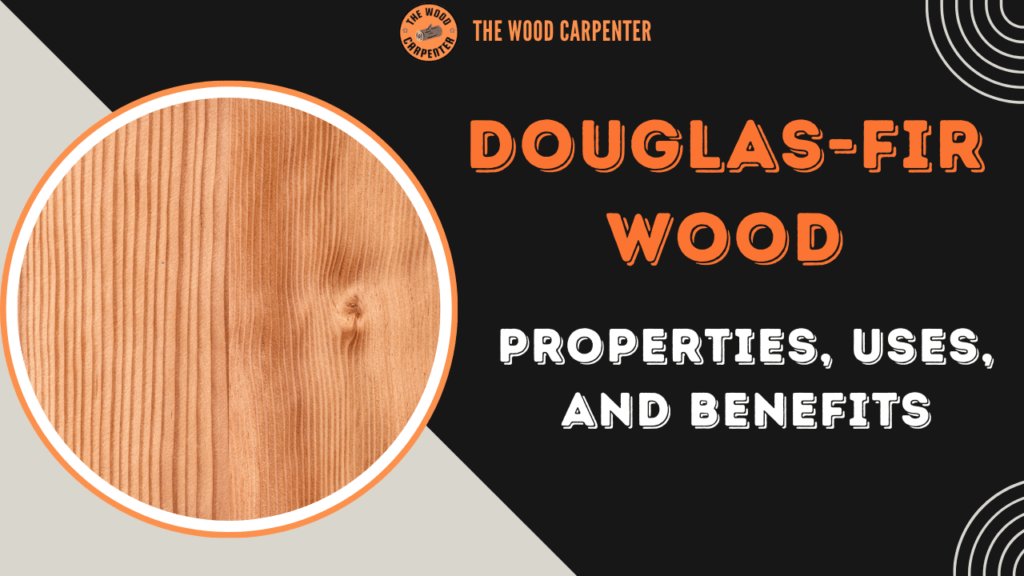
What is Douglas-Fir ?
Douglas-Fir (Pseudotsuga menziesii)Douglas-Fir is a softwood species that originates from western North America, but which is also cultivated in Europe, New Zealand and South America. Despite its name, it is not a true fir, but a genus of its own. It is very tall (reaching heights of up to 75 metres) and produces long, straight-grained timber which makes it excellent for construction and structural use.
Appearance: What Does Douglas-Fir Look Like?
Heartwood Color: Heartwood varies in color from yellow to orange, to reddish-brown.
Sapwood: Light coloured with a band between 50–75 mm wide.
Grain: Primarily straight but with pronounced earlywood–latewood contrast that provides a unique and appealing appearance.
Texture: Medium though can be coarse, uneven.
With age, Douglas-Fir color deepens, from a lighter reddish range to a cinnamon-reddish tone, and is thus attractive in structural and decorative woodwork alike.
Properties of Douglas-Fir Wood
1. Strength and Stability
Strong and relatively hard for a softwood, it has very poor steam bending properties and one of the weakest side to side strengths because of its large difference between radial and tangential plane strength. It excels in:
- Bending strength
- Compression strength
- Shear resistance
- Stability (no or low shrinking and warping)
2. Workability
- Machines, planes, and turns well.
- Bonds easily with standard glues.
- May be nailed and screwed satisfactorily, but nails may track growth rings.
- Needs a good sharp blade to avoid ridging when planing.
3. Durability
- Moderate decay resistance — doesn’t have as much natural decay resistance as cedar or redwood.
- Weather resistance especially, when treated, is able to be used outside.
- Most Resin Content – It might have an impact on painting/finishing but on the condition that is well-prepared it stains and finishes gorgeously.
4. Drying
- Dries quickly with minimal checking.
- Is Non-hydroscopic After Drying, Even In Extreme Lengths And Large Diameters.
Common Uses of Douglas-Fir
Douglas-Fir is highly adaptable and most commonly used in the:
- Building: Beams, posts, poles, house framing, trusses and bridges.
- Marine & Landscape: Pilings, Treated lumber, Pergolas, and outdoor decking.
- Flooring & Paneling – Often Prime grade wood which features a warm color and grain.
- Furniture & Joinery: Chairs, Tables, Cabinets + Fine Joinery projects.
- Plywood & Veneer: High quality plywood manufacturers making your needs the top priority.
7 Disadvantages of Douglas Fir Wood
1. Susceptibility to Rot and Decay
Perhaps the greatest downside to Douglas Fir is that it has no natural resistance against rot and decay. Douglas Fir wood does need a treatment and sealing when used outside, unlike cedar or redwood. It doesn’t take care of itself, and It will go downhill fast if not kept dry.
Solution:
- For outdoor projects start use pressure-treated Douglas Fir.
- Use water-repellent coatings or sealants to extend it’s life span.
2. Prone to Scratches and Dents
Douglas Fir is a durable species, but remember it is still a softwood that scratches and dents easily if not handled properly. This may be a problem, especially where floors are concerned or on pieces of furniture that will get heavy use.
Solution:
- Use area rugs and protective pads for flooring.
- Apply the surface with something like polyurethane as well.
3. Not Waterproof
Douglas Fir absorbs water well and may become warped, swollen, or damaged by mold if not treated further. If left untreated, exposure to excessive moisture can reduce its lifespan significantly.
Solution:
- Seal and service outdoor applications as needed.
- Don’t use Douglas Fir in very high-moisture environments (such as bathrooms).
4. Requires Regular Maintenance
In order to keep the appearance and integrity of Douglas Fir, it needs stain or paint applied regularly. If not treated, the wood may fade, crack or deteriorate in quality.
Solution:
- Plan for periodic refinishing for furniture and floors.
- Stain UV resistant to avoid sun destroys.
5. Susceptibility to Termite and Pest Damage
Douglas Fir is not immune to insect problems such as termites. If left untreated, it is liable to pests that can structurally damage your home.
Solution:
- Apply pest-resistant treatments before installation.
- Prevent pests by keeping wood dry and well-ventilated.
6. Inconsistent Grain Patterns
Many pieces of Douglas Fir will have knots and varying grain patterns, which is not very optimal for a project where you want everything to be smooth and uniform.
Solution:
- Choose the higher end of grade Douglas Fir for furniture or showcase projects.
- Sand and finish properly to minimize imperfections.
7. Expensive Compared to Other Softwoods
It is of course more expensive than softwood alternatives, such as Pine or Spruce.
Solution:
- Check prices against substitutes such as Yellow Pine or Cedar.
- For cost-effective alternatives, think about engineered wood products. using engineered wood products for budget-friendly alternatives.
Douglas Fir vs Other Woods: Key Differences
| Feature | Douglas Fir | Yellow Pine | Cedar |
|---|---|---|---|
| Rot Resistance | Low | Low | High |
| Strength | High | Medium | Medium |
| Durability | Moderate | Moderate | High |
| Price | Higher than Pine | Lower than Fir | Expensive |
| Maintenance | High | Moderate | Low |
| Best For | Construction, Flooring | General Use | Outdoor Projects |
Also read: Douglas Fir vs Yellow Pine: Finding the Perfect One
Frequently Asked Questions (FAQs)
1. What are the disadvantages of Douglas Fir wood?
The principal drawbacks are a tendency to rot, high maintenance requirements, lack of waterproofing and relatively higher cost than other softwoods.
2. How long does Douglas Fir last?
When cared for correctly, Indoors don’t last 10-20 years and outdoors up to 5-10 years without treatment.
3. Is Douglas Fir waterproof?
No, Douglas Fir is not waterproof by nature. It needs to be sealed and protected to prevent water damage.
4. Does Douglas Fir scratch easily?
Yes, Douglas Fir is a softwood and does scratch, dint and imperfections do show on the surface so it’s not great for high traffic areas.
5. Is Douglas Fir better than Yellow Pine?
It depends on the application. Douglas Fir is stronger and more durable, while Yellow Pine is cheaper but less durable.
Related Article:
Douglas Fir vs Yellow Pine: Finding the Perfect One
6. What is the cost of Douglas Fir wood?
Prices differ but appear to be more expensive than Pine and cheaper than Cedar.
7. Does Douglas Fir need to be treated for outdoor use?
Yes, it requires staining or sealing to prevent rot, moisture damage, and insect infestations.
8. Is Douglas Fir a good choice for flooring?
Yes, but it requires regular maintenance and protective coatings to prevent scratches and dents.
9. What are the common applications of Douglas Fir?
- Construction
- Flooring
- Furniture
- Plywood
10. Can Douglas Fir be used for decking?
Yes, but it must be sealed properly to prevent weather damage.
11. How does Douglas Fir compare to Cedar for outdoor use?
Cedar is naturally rot-resistant, while Douglas Fir requires treatment to prevent decay.
12. What are the best finishes for Douglas Fir?
- Polyurethane
- Oil-based stains
- Water-repellent preservatives
13. Does Douglas Fir darken over time?
Yes, Douglas Fir will darken as all wood does with exposure to light.
14. Is Douglas Fir toxic?
No, It won’t do you any harm, Douglas Fir is not toxic and is suitable for indoor use.
15. How does Douglas Fir perform in humid climates?
It absorbs moisture easily, making it less suitable for high-humidity environments.
16. Can you paint Douglas Fir?
Yes, but proper sanding and priming are necessary for a smooth finish.
17. Does Douglas Fir expand and contract?
Yes, like all woods, Douglas Fir will expand and contract with humidity changes.
18. Is Douglas Fir good for furniture making?
Yes, apply sealant and it will last.
19. What makes Douglas Fir unique?
It is known for high strength, fine grain, and durability.
20. Is Douglas Fir sustainable?
Yes, the Douglas Fir is very well farmed and sustainable wood source.
Conclusion
It’s strong and versatile, but Douglas Fir has it’s downsides. However, if you’re thinking of using it on the next thing you work on, it’s good to note that this surface is not resistant to moisture or scratches and does require some maintenance . It is indeed an excellent material for construction and furniture, with proper treatments. Choose among them with caution depending on the needs of your project and/or budget!

